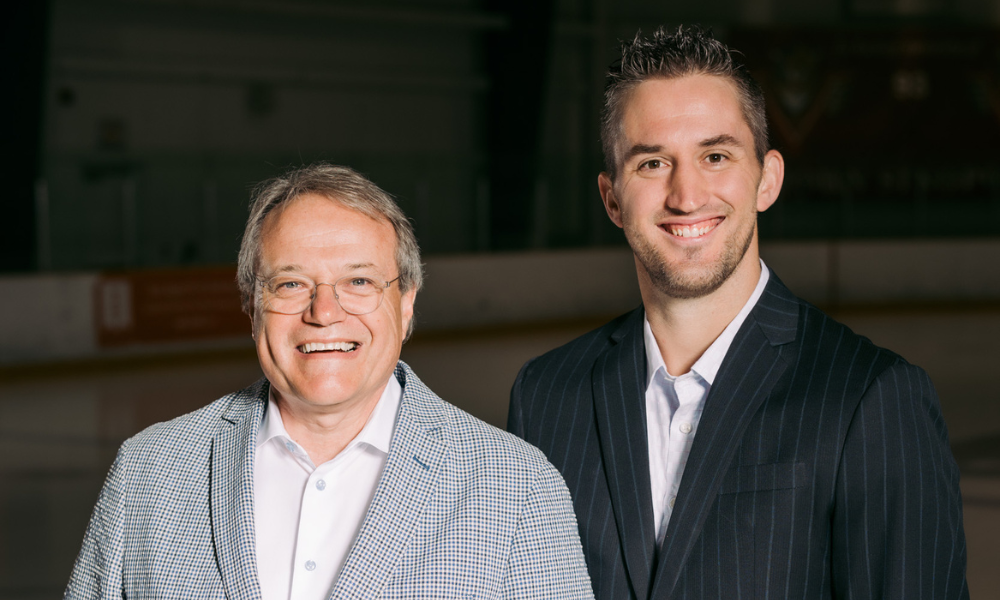Wealth advisor breaks down why defence is key for elite athletes

As someone raised by a figure skater father just a stone’s throw from a rink, Rob Martini is among countless Canadians who grew up with ice in their veins and hockey in their DNA. But that’s just one of the reasons why he enjoys working with professional hockey players.
“I love people who are internally driven and want to get the most out of a situation,” Martini (pictured above, right) says. “I find 99.9% of the time, that's what you're going to get with a hockey player.”
A former elite player and international-level hockey coach, he is now an associate portfolio manager at KJ Harrison. Along with Mike Jaczko – a partner and portfolio manager at the firm, who’s also been passionately working with hockey player clients for around 10 years – he’s the co-author of “Skateguard: Surviving and Thriving in Professional Hockey,” which offers comprehensive advice on how to achieve success financially and in life as a pro athlete in the sport.
“There's only 800 or so jobs in the NHL, and everyone around the planet who plays hockey at any level, that's likely their end goal,” Martini says. “It requires your full time and full focus.”
An ‘inverted income pyramid’ for hockey pros
For countless Canadians, the opportunity to play hockey for a living – particularly at the NHL level – would be a dream come true. But those who achieve that dream also tend to go through what Martini calls an “inverted income pyramid.”
Most people start their professional life with smaller salaries and limited financial skills. As they go up the career ladder, their earning potential increases, along with their ability to navigate tax filing, bills, budgeting, and other financial realities.
For professional hockey players, it’s a different story. Martini says the average age of a forward in the NHL is 23 years old. Estimates for the average hockey player’s salary, meanwhile, hover around $3 million a year, with $750,000 being the minimum wage for the 2022-2023 season.
“You have young people being handed these vast sums of money at a frighteningly young age,” he says. “On the other side of the coin, the average NHL career lasts just around four years, which can be a shock for these twentysomething-year-olds who might have gotten used to a more elevated lifestyle.”
While many NHL players find new opportunities to lace up professionally overseas or in the lower leagues, they usually take a pay cut in the process. They also face career risks: one injury, a bad season, and any number of other factors can mean they end up sidelined or, in the worst cases, permanently unable to play the game.
For elite athletes, defence is key
Professional athletes, Martini is quick to note, don’t necessarily stand at the top of the rankings of high-income earners; lawyers, doctors, and CEOs can make as much or more than the average hockey player does. But because hockey players’ salaries are publicly known, they’re more likely to be targeted and exploited by bad actors, and not have the financial education to protect themselves.
“We certainly see the classic issues of overspending with some guys,” he says, “and we see a lot of people who just don't get good advice.”
At KJ Harrison, Martini, Jaczko and others are working to solve the problem at the source by engaging with junior hockey teams, prep school teams, and even youth hockey organizations. Through financial education, he says they’re equipping young people not just for a career on the rink, but for wherever life takes them in the future.
He also encourages athletes to surround themselves with the right people to protect themselves financially, which involves an extensive process of vetting. With time and effort, he says, an elite athlete should be able to find a financial quarterback to head a team of trusted advisers – an accountant, a lawyer, an agent, and possibly other experts – to act in their best interests.
“If I could sum up what we do in one word, it would be protection,” Martini says. “These guys lead extremely busy lives. … It's so difficult to do this on your own.


